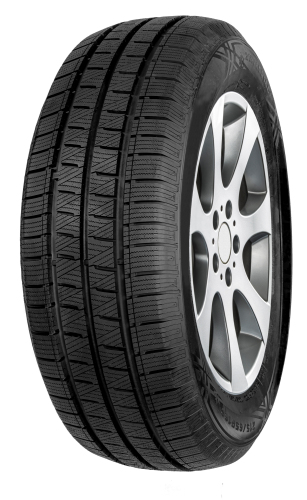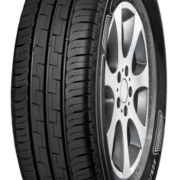Deldo introducing new lines & sizes despite volume cuts
 New for winter 2021/22 - Frostrack Van
New for winter 2021/22 - Frostrack Van
Hindsight is said to be 20/20, yet this isn’t a faculty that helped the tyre industry this year. Early optimism driven by vaccine rollouts quickly turned to despair as sideways-parked container ships, skyrocketing sea freight prices, rising material costs and supply shortages delivered blow after blow. As we enter the final quarter of the year we have a much clearer view of what’s going on, and what we see is that tyres will be pricier in the coming months – assuming we can get our hands on them.
We caught up with Tom Van Dyck from Deldo during our preparations for our October magazine’s wholesale feature. The Antwerp-based wholesaler offers its customers six private brands and is thus well-positioned to understand the complexities of importing and supplying tyres in 2021. Van Dyck, Deldo’s director of sales and organisation, believes predicting market trends has never been as difficult as it is today.
“The Suez Canal was blocked at the end of March, and shipments afterwards got into trouble. The extreme sea freight price increases and tighter supplies we’re now seeing only really began in April,” he comments, adding that the impact upon Deldo was initially minimal as its stocks of 1.5 million tyres and location within the major port of Antwerp ensured good availability and helped maintain sell-out pricing stability until late June. After that, the larger European ports began experiencing the congestion already plaguing their smaller counterparts. “We began feeling the impact during the summer months.”
The timing of the Ever Given’s canal caper couldn’t have been worse for the winter tyre season, as the months between April and June are crucial for shipping pre-orders. “No containers arrived,” shares Van Dyck. “Selling towards the winter season has been hit in an unprecedented way, and availability will be tremendously poor in the next few months.” Deldo remains nonetheless committed to its manufacturing partners in China; setting up production sites closer to home would take several years and deliver a whole new set of uncertainties, such as shortages of skilled labour and constantly evolving environmental policies.
Enforced production cuts in China
A significant drop in volumes exported to Europe had the knock-on effect of reduced production in China. Van Dyck talks of plants cutting production volumes by 50 per cent over a period of two to three months. More recently, authorities in China have ordered factories to cut capacities in order to combat domestic electricity shortages. “All factories we work with have announced capacity decreases for the next few months as there’s not enough energy for the local population. Factories everywhere are decreasing capacity. This guarantees extremely poor availability during the winter season.” This means just one thing for customers in the UK and Europe: “Increased demand, low supply and rising raw materials costs will result in increased prices for tyres. Prices are higher than at any time during the past ten years. The last time we saw pricing like this was in 2010, when Europe experienced a very strong winter.”
According to Deldo’s director of sales and organisation, the cost of manufacturing and shipping a budget tyre has risen by around 30 per cent over the past 12 months. While this increase is much more dramatic than the ten per cent average increase that premium manufacturers have faced, Van Dyck notes that the pound or euro increase per tyre is similar for both products. Furthermore, he considers that these rises aren’t necessarily a negative development for the tyre business: “We’ve been losing turnover over a period of ten years due to price decreases. Finally, we have structural price increases.”
If there are any winners in the current situation, it may well be the premium tyre manufacturers. “Their costs have increased, but not by ten per cent,” emphasises Tom Van Dyck. “Because heavy costs are driving significant price increases in the budget sector, the premiums have the commercial space to increase their prices by ten per cent. This means that premium manufacturers are profiting from the situation a little, but it is okay for us too.”
Relationships with partners a 2021 focus
Although absent shipments and limited production forced Deldo to cancel substantial volumes in recent months, and at the same time the wholesaler has needed to increase prices to offset rising costs, customers have understood the situation. “Fortunately, all our partners and clients were already well informed. This isn’t just a problem within the tyre business.”
The present market situation is uncharted territory for sales directors such as Tom Van Dyck. He confirms that Deldo isn’t pushing sales at all at the moment. “We’re working on relationships with clients. Our main concern and focus in 2021 is to serve existing partners, to keep them on board despite very difficult market circumstances this year.” These efforts are being supported by face-to-face visits with clients located outside Belgium, an invaluable form of contact that until recently hadn’t been possible since March 2020.
New ranges & sizes
Deldo will introduce the Transport2 RF19 for next summer
Deldo also continues to make additions to its private brand portfolios despite the lower volumes being shipped. It is introducing Frostrack Van, a new light truck pattern, for winter 2021 in 12 sizes, and following this up next year with a summer van pattern, Transport2 RF19, in 19 dimensions.
The wholesaler is also growing existing lines, with a further 15 summer sizes lifting Deldo’s private brand summer portfolio to a total of 314 sizes. Furthermore, the introduction of 16 new all-season sizes elevates this particular range to 143 sizes in total. “Three of our brands, Imperial, Minerva and Tristar, offer the biggest all-season size range in the market,” comments Van Dyck. “We’ve continued investing in patterns and sizes.”
Market never been so uncertain
As on past occasions, we asked Tom Van Dyck what he expects to encounter going forwards. On this occasion the answer to this question is much more opaque than usual, and he points out that maritime and logistics experts don’t anticipate the current situation improving any time soon. Enormous stocks of all kinds of products are still sitting in China awaiting shipment, Christmas is around the corner and Chinese New Year – traditionally a festival that disrupts production and shipping – occurs relatively early in 2022.
“In my opinion the situation won’t improve any time before March 2022,” the director of sales and organisation adds. “But our summer tyre shipments for 2022 need to be made in December or January, meaning that the summer season 2022 will be just as difficult as winter 2021/22, complete with shortages and price increases. We hope we’ll see improvement in mid-2022, but it still much too early to know.”
Van Dyck opines that even if production cuts in China lead to lower demand for containers and corresponding decreases in shipping rates, tyre prices will likely remain high thanks to rising raw material costs and efforts on the part of factories to compensate for lost production output: “These are extra factors making it even more complex to try and predict what will happen in the next few months. The market has never been so uncertain as today.”
Although Tom Van Dyck doesn’t attempt to gloss over the issues facing wholesalers such as Deldo (and almost every firm engaged in global trade) at this point in time, he remains sanguine about the tyre market’s future development. Most of the current problems should be behind us by winter 2022/23 at the latest, and as already pointed out, a reversal of the trend towards price increases over recent years may not be such a bad thing after all. We’ll know all this for sure sooner or later, thanks to the clarity of hindsight.





Comments